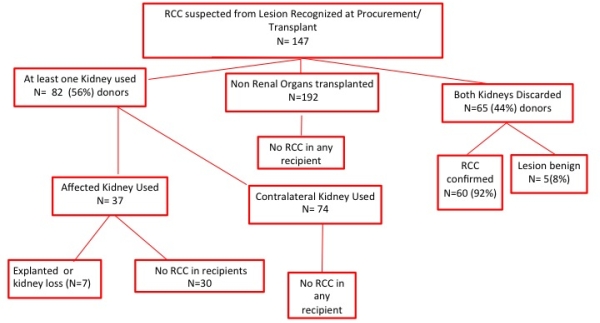Donor Derived Renal Cell Carcinoma (RCC) Transmission Events 2008-2016: A Report of the OPTN Disease Transmission Advisory Committee (DTAC)
OPTN/UNOS, RCC Work Group.
Meeting: 2018 American Transplant Congress
Abstract number: 112
Keywords: Donation, Malignancy, Post-transplant malignancy
Session Information
Session Name: Concurrent Session: Kidney Donor Selection / Management Issues - 1
Session Type: Concurrent Session
Date: Sunday, June 3, 2018
Session Time: 4:30pm-6:00pm
 Presentation Time: 4:54pm-5:06pm
Presentation Time: 4:54pm-5:06pm
Location: Room 6E
Background: RCC is the most common renal tumor reported to the OPTN and reviewed by DTAC for assessment of potential donor transmission. Organs with concern for RCC are frequently discarded.
Methods: All reported cases of suspected RCC between 1/1/08 through 12/31/16 were evaluated by DTAC for organ and recipient outcomes. In addition to recipient outcome data provided through the report, standard OPTN Post-Transplant Malignancy forms were reviewed to identify subsequent recipient malignancies. An event was defined as all potential malignancy transmissions from a donor to > 1 recipient(s).
Results: 179 reports of suspected donor RCC transmissions were submitted to the DTAC; 170 were deceased donors (DD) and 9 were live donors (LD). From the 170 DD, 321 kidneys were recovered. 160 of those kidneys were transplanted into 154 different recipients. 161 kidneys were recovered and then discarded. From the 9 live donors, all kidneys were transplanted. 147 donors had suspicious lesion noted at procurement  In 65 DD with suspected RCC, both kidneys were discarded; when RCC was confirmed (N=60) it was unilateral in all but 1 (5 cases were benign tumors). 7 kidneys were lost from unrelated causes or explanted when a biopsy revealed RCC.
In 65 DD with suspected RCC, both kidneys were discarded; when RCC was confirmed (N=60) it was unilateral in all but 1 (5 cases were benign tumors). 7 kidneys were lost from unrelated causes or explanted when a biopsy revealed RCC.
11 recipients were diagnosed with RCC from 10 donors at 2 to 18 months post-transplant (median = 7 m). RCC was not suspected at procurement in any of these cases.
Finally, 9 patients were identified with donor-derived RCC. The interval between transplant and RCC diagnosis ranged from 34 to 160 months. These tumors were felt not to have been identifiable at transplant and were deemed donor-derived but not transmitted.
Conclusions: These data suggest that excision of small well-differentiated renal cell carcinomas prior to transplant provides outcomes similar to those in patients who receive kidneys from donors without RCC. Additionally, the use of contralateral kidneys and non-renal organs from these patients is not associated with an increased risk of RCC development.
CITATION INFORMATION: Pavlakis M., Michaels M., Tlusty S., Turgeon N., Vece G., Wolfe C., Wood R., Nalesnik M. Donor Derived Renal Cell Carcinoma (RCC) Transmission Events 2008-2016: A Report of the OPTN Disease Transmission Advisory Committee (DTAC) Am J Transplant. 2017;17 (suppl 3).
To cite this abstract in AMA style:
Pavlakis M, Michaels M, Tlusty S, Turgeon N, Vece G, Wolfe C, Wood R, Nalesnik M. Donor Derived Renal Cell Carcinoma (RCC) Transmission Events 2008-2016: A Report of the OPTN Disease Transmission Advisory Committee (DTAC) [abstract]. https://atcmeetingabstracts.com/abstract/donor-derived-renal-cell-carcinoma-rcc-transmission-events-2008-2016-a-report-of-the-optn-disease-transmission-advisory-committee-dtac/. Accessed February 12, 2026.« Back to 2018 American Transplant Congress
